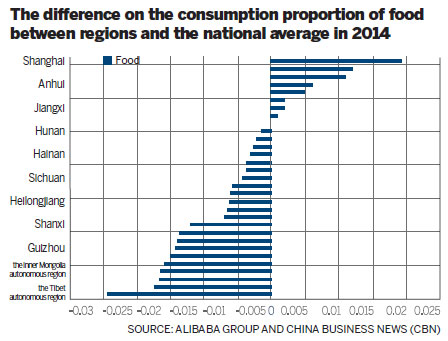Yangtze River Delta outspends other regions
Updated: 2015-06-19 11:31
By Xu Junqian in Shanghai(China Daily USA)
|
|||||||||
The online fresh food market experiences tremendous growth expected to continue
Consumers from Shanghai, Zhejiang and Jiangsu provinces, more commonly known as the Yangtze River Delta, are spending more generously on food and snacks online than neighboring towns, according to a report jointly released by Alibaba Group and China Business News (CBN) on June 11.
The report signaled the first move since China's e-commerce giant, Alibaba, invested $193.6 million (1.2 billion yuan) into CBN on June 5, a financial media company under the country's second largest media conglomerate, Shanghai Media Group. The partnership is expected to better tap into the rich mine of financial data.
The report is titled China Characterized Consumption Report.
Consumers from the three regions not only top the first three in terms of online shopping in 2014, but also pay far above national average on food, especially fresh food, the report revealed.
According to statistics provided by consulting firm Analysis Enfodesk, the e-commerce market of fresh food increased by 122.6 percent in 2014 from the previous year, reaching 2.89 billion yuan. It is expected to reach 5.44 billion yuan by the end of 2015, according to Analysis Enfodesk forecasts.
"The growth is mainly driven by the increasing number of providers. As online shopping has turned from a trend into a habit for almost every young person in the country, businesspeople are penetrating into every aspect of our daily life," said Wang Xiaoxing, analyst with Analisys Enfodesk.
The Alibaba report pointed out that fresh food e-commerce features an average gross profit margin of 30 to 40 percent, significantly outnumbering that of other categories.
But industry insiders painted a less rosy picture. It is estimated that since 2014 there were over 3,000 e-commerce platforms or websites in China selling fresh food, yet less than 1 percent of the players, if not none, has managed to make a profit, according to Li Changming, a senior researcher of China Retail Research Center's fresh food division.

"There are multiple factors deciding, if not threatening, the profitability of the business in China," said Wang, the analyst.
The agriculture pattern in China, characterized by small scale and individuals, has made it difficult to provide a grand-scale and consistent basis on certain type of produce in the first place; the incomplete logistics industry, especially the highly demanding cold chain logistics, adds to the cost of the business; and the major clientele of online shopping are people below the age of 30, individuals who are changeable in terms of shopping habit, trend-driven, and most importantly, have yet become the grocery shopper of a household, as Wang pointed out.
By August, SF Express, one of China's largest and most expansive delivery companies, has increased the destinations of its cold chain delivery from 11 to 48 cities. Cold chain logistics refers to the preservation and transportation of fresh food maintained at or minus 18 degrees Celsius.
But the market remains lucrative for both investors and players.
E-commerce currently represents less than 1 percent of China's more than 700 million tons of annual fresh food sales, according to China Retail Research Center.
In 2014, US online shopping behemoth Amazon.com Inc., bought a stake with $20 million in Yummy77.com, a fresh food e-commerce site founded and based in Shanghai. Meanwhile, its China rival Alibaba Group invested in Yiguo.com, a Shanghai-based website known among locals with its offerings of imported fruits.
"If China's fresh food market is ever going to pay off, high priced offerings like imported fruits, steak and seafood might be the triggers, as they are largely missing in the country's brick-and-mortar stores and wet markets. What's more, increasingly health-oriented Chinese consumers are more than ready to pay big on these offerings and the delivery fees," said Wang.
xujunqian@chinadaily.com.cn
Most Viewed
Editor's Picks

|

|

|

|

|

|
Today's Top News
Obama suggests more gun control after shooting
Talks seen as prelude to visit by President Xi to US in September
The most costly cities for expats
House passes fast-track trade bill
Gunman kills nine people in South Carolina church shooting
US House moves to revive Obama's Pacific trade pact
Hong Kong lawmakers reject election reform proposal
Lies and false hopes entrap Xinjiangers
US Weekly

|

|















